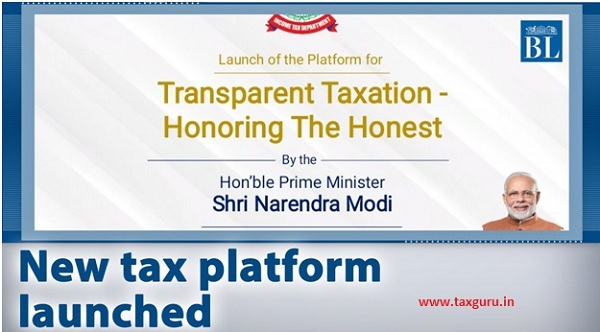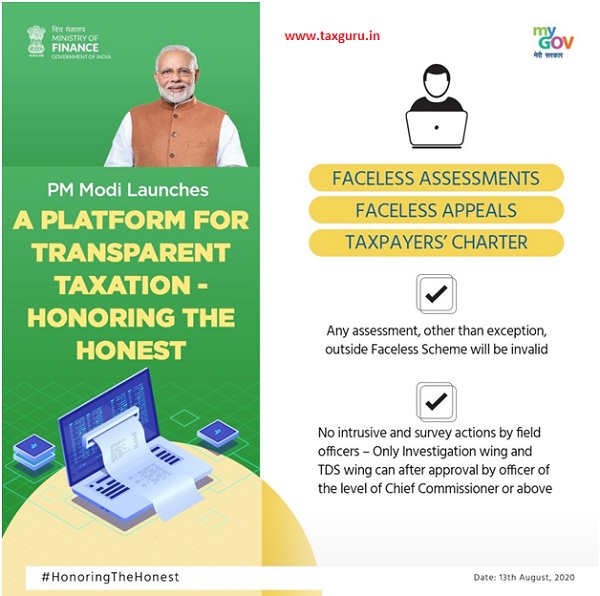The CBDT has carried out several major tax reforms in direct taxes in the recent years, which includes the following:
(i) Reduction in corporate tax to 22% from 30% for existing companies and 15% for new manufacturing units.
(ii) Abolition of dividend distribution tax
(iii) Simplification of compliance norms for startups
(iv) Settlement of pending litigations and disputes of direct tax through “Vivad se Vishwas Act. 2020”
(v) Threshold for filing department appeals before various appellate courts have been raised to reduce taxpayers grievances or litigation
The focus of above reforms is reduction in tax rates and simplification of direct tax laws.
CBDT has also taken several initiatives to bring efficiency and transparency in the functions of Income tax department which includes document identification number (DIN) and pre-filing of income tax returns to make compliance more convenient.

Prime Minister Mr. Narendra Modi on Thrusday 13.08.2020 launched the platform for ‘Transparent Taxation – Honoring the Honest’ which aimed at easing compliance and expediting refunds, benefiting honest taxpayers.
Mr. Modi in his speech on 13.08.2020 has praised the role of honest taxpayers and said that “When the life of an honest taxpayer of the country becomes easy, he moves forward and develops, then the country also develops and leaps forward.” According to him, complexity in system brings problem in compliance.

Three main features of the above platform are:
- Faceless assessment,
- Faceless appeal
- Tax payers’ charter
Faceless assessments:
The scheme not only aims to eliminate the interface between the taxpayer and the income tax department but also reduce the scope for corruption and overreach by officials.
Under the system, the selection of a taxpayer is possible only through systems using analytics and artificial intelligence. The system abolishes territorial jurisdiction. A taxpayer may belong to a particular city but the assessment order, the review and the finalisation will take place in different cities. Cases will be automatically allotted on a random basis. There will be no need for the taxpayer to visit the income tax office or the officer. The decision will be team-based and reviewed. Any assessment, other than the exceptions outside the faceless scheme, will be invalid. The scheme is come into effect w.e.f 13.08.2020.
Faceless appeal:
Under the system, appeals will be randomly allotted to any officer in the country. The identity of the officer deciding the appeal will remain unknown. The taxpayer will not be required to visit the income tax office or the officer and the appellate decision will be team-based and reviewed.
Taxpayers Charter:
The Taxpayers’ Charter was announced by the Finance Minister Nirmala Sitharaman in her Budget 2020 speech and the same is launched by Mr. Modi on August 13, 2020. The aim of introducing the charter is to build a trust between a tax payer and the tax administration and reduce harassment. It is come into effect w.e.f August 13, 2020.
Under this, tax payers can approach the Taxpayers’ Charter Cell under the Principal Chief Commissioner of Income tax in each zone for compliance to this charter. The charter lists out the income tax department’s commitments to the income taxpayer as well as what the department expects from the taxpayers.
| Income tax department is committed to | Department expects from the tax payer |
| 1. To provide fair, courteous and reasonable treatment | 1.Be honest and compliance |
| 2. Treat taxpayer as honest | 2. Be informed |
| 3. To provide mechanism for appeal and review | 3. Keep accurate records |
| 4. To provide complete and accurate information | 4. Know what the representative does on his behalf |
| 5.To provide timely decision | 5. Respond in time |
| 6. To collect the correct amount of tax | 6. Pay tax in time |
| 7. To respect privacy of taxpayers | |
| 8. To maintain confidentiality | |
| 9.To hold its authorities accountable | |
| 10. To enable representative of choice | |
| 11. To provide mechanism to lodge complaint | |
| 12. To provide a fair & just system | |
| 13. To publish service standards & report periodically | |
| 14. To reduce cost of compliance |
Contact: vidhi.doshi18@gmail.com





